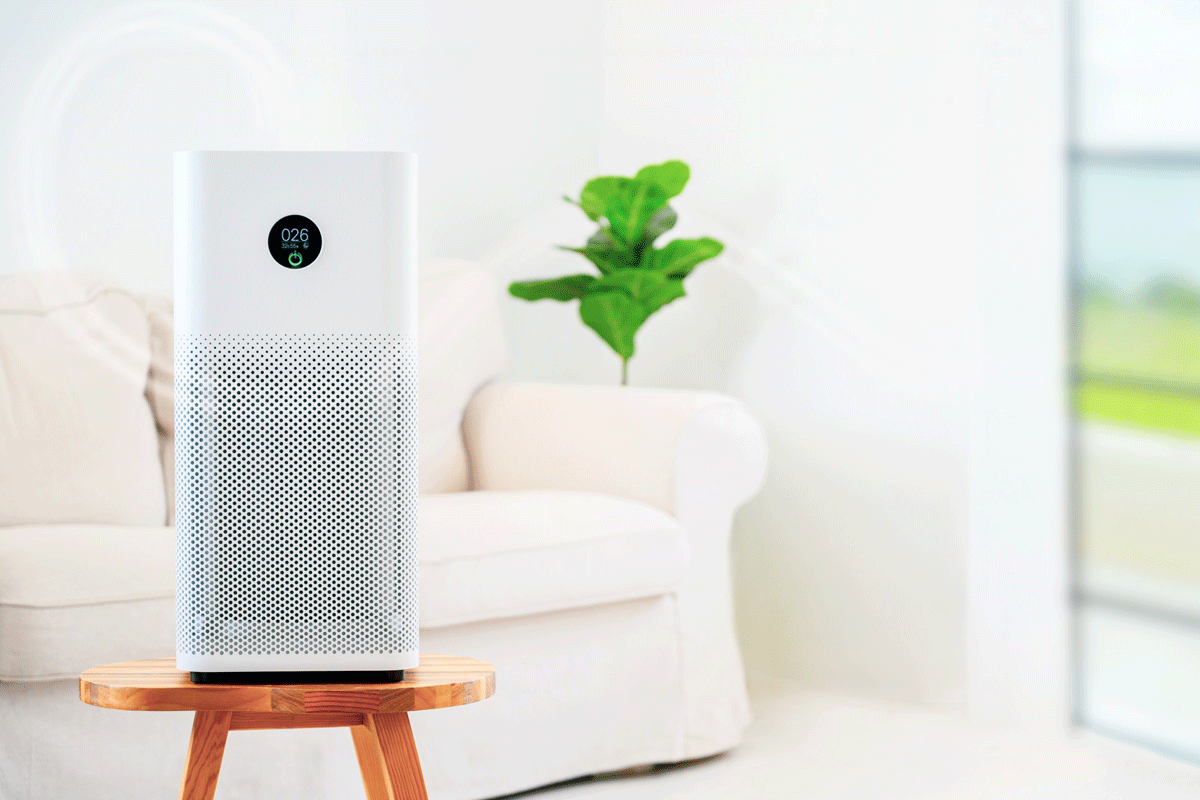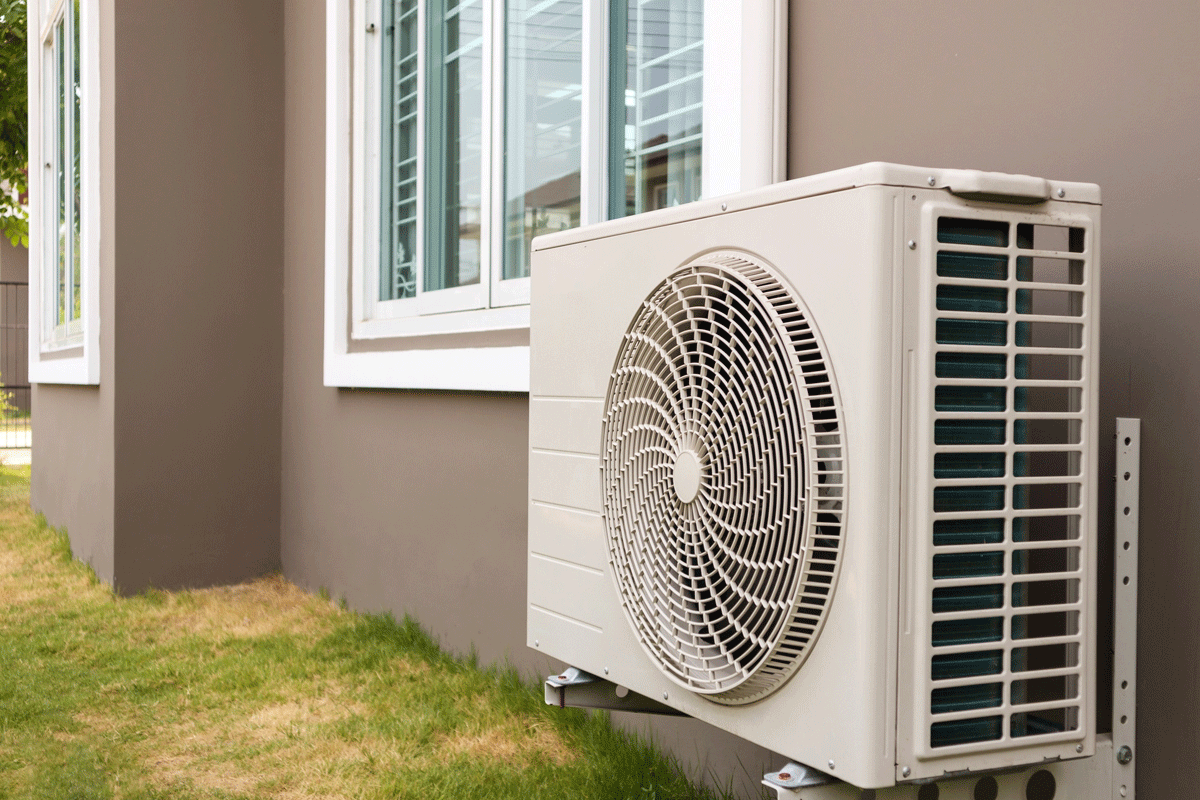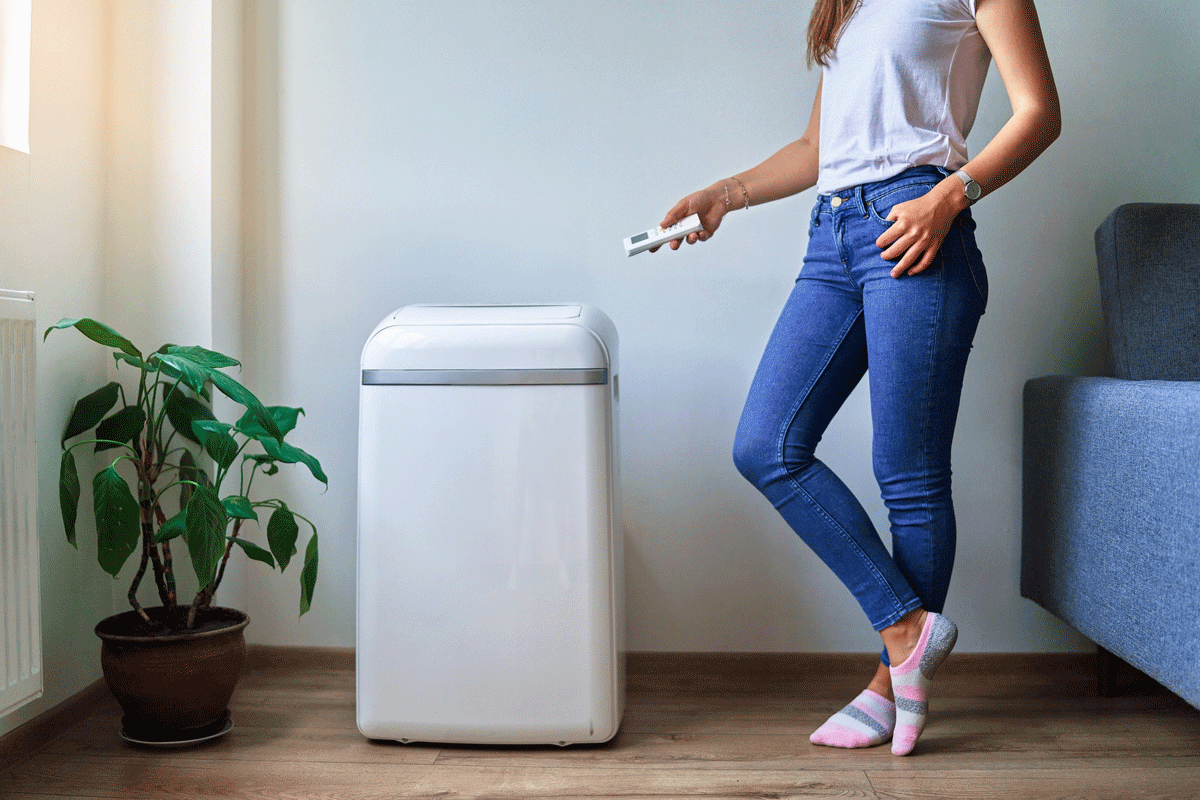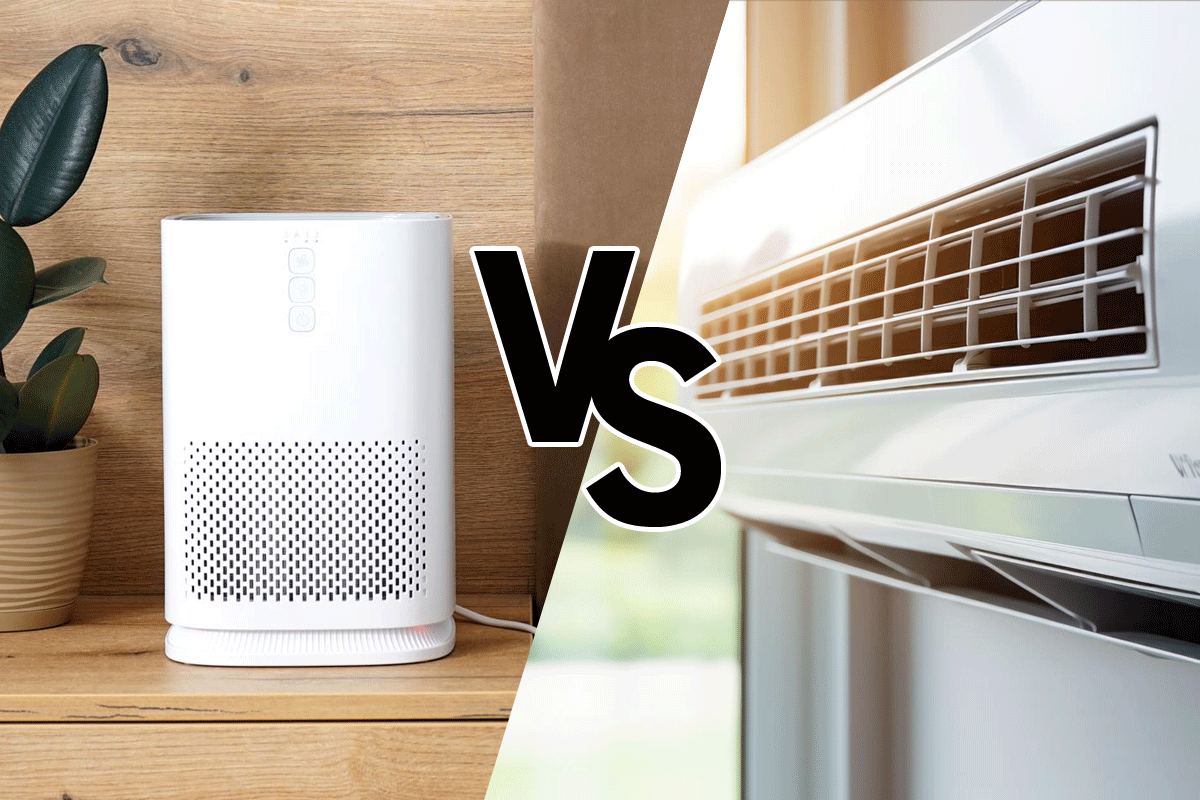In this post, we’re going to explore the air purifier vs air conditioner question so you can get a clear understanding of how each device works. You’ll also come away knowing which product is best suited for your needs.
At their core, air conditioners and air purifiers have different functions in the home when it comes to indoor comfort and air quality.
Here’s a quick summary of those differences before we dive into the rest of this guide:
- An air conditioner draws the hot air out of a room and pumps cold air back in to cool it down. These appliances control the indoor temperature, humidity, and to a small extent, the air quality.
- An air purifier cycles the indoor air through a series of filters to clean it or neutralize the air particles with a process called ionization. These systems remove airborne contaminants that are known for lowering the quality of your indoor air.
Air Purifier vs Air Conditioner
The main difference between an air purifier and an air conditioner is that air purifiers eliminate airborne particles while air conditioners cool the air. AC units are not designed for air purification and air purifiers are not made for cooling the air.
Comparison Chart
Here is a side-by-side comparison between air purifiers and air conditioners (or air coolers), which will be covered more in depth throughout this guide.
| Criteria | Air Purifier | Air Conditioner |
|---|---|---|
| Application | Cleans indoor air by removing airborne contaminants like allergens, germs, smoke, and odors. | Cools indoor temperature and helps reduce humidity. |
| Benefits | Improves overall air quality and leads to better health for everyone; however, air purifiers are especially useful for asthmatics and allergy sufferers. | Creates a comfortable indoor environment and has a low level of air purification. Air conditioners are good for people with respiratory issues who can’t handle high humidity levels. |
| Removes or Reduces | Dust, Allergens, Smoke, Mold Spores, Bacteria, Pet Dander, and some Viruses. | Temperature and Humidity. |
Basic Functions of Air Purifiers and Air Conditioners
One of the easiest ways to tell the difference between air purifiers and air conditioning units is by understanding their basic functions.
Air Purifier
An air purifier’s primary function is to remove airborne particles and contaminants that cause respiratory issues and illnesses. This includes common things like pollen, dust, pet dander, bacteria, mold spores, smoke, viruses, and all kinds of odors.

Air purifiers come in two major types:
- HEPA Filtration: An air purifier with a HEPA filter cycles indoor air through a filtration system that traps and collects airborne pollutants inside a filter. Clean air is then delivered back into the room.
- Ionization: An air purifier that uses ionization emits negatively charged ions into the air that latch onto positively charged contaminants. This causes particles to fall to the ground or stick to surrounding surfaces.
Some HEPA air purifiers also include an activated carbon filter which is designed to remove unpleasant odors from smoke, cooking, mold, and pets. As odor particles pass through the activated carbon filter, they are trapped in the porous material. When this happens, the odor-causing particles cannot re-enter in indoor air to produce a smell.
Air purifiers do not affect indoor temperature or humidity levels. These devices only clean the air so it is healthier for you to breathe.
Air Conditioner
An air conditioner’s main function is to cool down indoor environments by regulating the temperature and humidity. These devices work by drawing warm indoor air into the unit and cooling the air as it blows across a coil full of refrigerant. Heat from the air is absorbed into the refrigerant and the cooled air is distributed back into the room.

Air conditioners come in four major types:
- Central AC System: This system includes two parts: an indoor evaporator that absorbs heat from inside the home and an outdoor compressor that cools the air. Cooled air is returned into the home through ducts in the ceiling and/or floor.
- Mini-Split System: This system works similarly to a central air conditioner with both an indoor and outdoor unit; however, a mini-split system is ductless. It requires an indoor unit in every separate room that needs conditioned air.
- Window AC Unit: A window air conditioner is a self-contained AC unit that is installed on a window sill. It contains all parts of the air conditioning system to cool an indoor room and must be vented to the outdoors to expel the heat and humidity.
- Portable AC Unit: A portable AC unit works similarly to a window air conditioner; however, the portable unit sits indoors on the floor. A hose is connected from the unit to a window bracket to expel the heat and humidity outdoors.
All air conditioners contain filters to prevent dirt and debris from entering the system and damaging the components. As a result, an air conditioner does have a slight capability to purify the air of large airborne particles. However, AC filters are not dense enough to catch the microscopic particles that pollute indoor air such as fine dust, allergens, mold spores, and bacteria.
Which Is a Better Choice: An Air Purifier or Air Conditioner?
An air purifier may be the better option for you if:
- You need cleaner air because you have a respiratory condition like asthma, COPD, or allergies.
- You want to lower the amount of dust, pollen, or pet dander inside your home.
- You want to get rid of indoor odors from cooking, smoke, pets, mold, or mildew.
- You want a healthier indoor environment for your family that has fewer bacteria and virus particles floating around.
An air conditioner might be the better choice if:
- You want to have better control over your indoor temperature.
- You want to reduce the humidity levels inside your home.
- You have a respiratory condition like asthma or COPD that flares up when you’re exposed to high humidity levels.

Common Questions Regarding Air Purifiers and Air Conditioners
Can I use an air purifier with an air conditioner?
Yes, you can use an air purifier with an air conditioner. These two appliances have different functions and can work together to improve your indoor air quality and comfort. An air conditioner cools the air and reduces the humidity, while an air purifier cleans the air by removing pollutants.
Do air purifiers cool the air?
No, air purifiers do not cool the air. Air purifiers serve the singular function of cleaning the air and have no impact on the temperature. A slight breeze may be felt from a HEPA air purifier as it pushes clean air back into the room (similar to a rotary fan) but the air is not cooled by the unit.
Do air conditioners purify the air?
Air conditioners do not actively purify the air but these systems can help to improve the air quality indoors by reducing the number of larger allergens and pollutants in the air. An air conditioner contains a filter that raps larger dust and debris but these appliances will not catch the smaller particles that contaminate indoor air.
Do air conditioners bring in air from the outside?
No, air conditioners do not bring in fresh air from the outside. Air conditioners recirculate the indoor air after cooling it within the system.
Some commercial or industrial air conditioners may have a feature that allows the system to mix some outdoor air with indoor air for ventilation purposes, but that is not the case for residential air conditioners.
How often should I change the filters of my air conditioner and air purifier?
The frequency of changing the filters of your air conditioner and air purifier depends on several factors, such as the type and quality of the filter, the indoor air quality, the usage of the system, and the presence of pets or smokers in the home.
Generally, the following guidelines can help you determine how often to change your filters:
- Fiberglass Filters: These are the cheapest and least effective filters, and they usually need to be replaced every 30 days.
- Pleated Filters: These are more expensive and efficient filters, and they can last anywhere from 3 to 6 months.
- HEPA Filters: These are the most expensive and effective filters, and they can filter out 99.7% of particles in the air. They can last up to a year, but they may need to be replaced more often if the air is very polluted or if the system is used frequently.
- Carbon Filters: These are filters that can also capture gases and volatile organic compounds (VOCs) in the air. They can last from 3 to 6 months, depending on the level of odors and chemicals in the air.
To ensure optimal performance and air quality, you should check your filters regularly and replace them when they appear dirty or clogged. You can also consult the manufacturer’s instructions for specific recommendations on how often to change your filters.
Get the Right Air Purifier and Air Conditioner for Your Home
Interested in buying an air purifier or air conditioner for your home?
- See our top rated air purifiers for a variety of indoor air quality needs.
- Browse our list of air conditioners to find the right type of system for your house and budget.
Summary of Air Purifiers vs Air Conditioners
You should now have a good grasp on the air purifier vs air conditioner topic. As you discovered, air purifiers and air conditioners have different functions inside the home for improving air quality and comfort. We hope that this guide has given you everything you need to make the right decision on which appliance to use for your particular needs.

